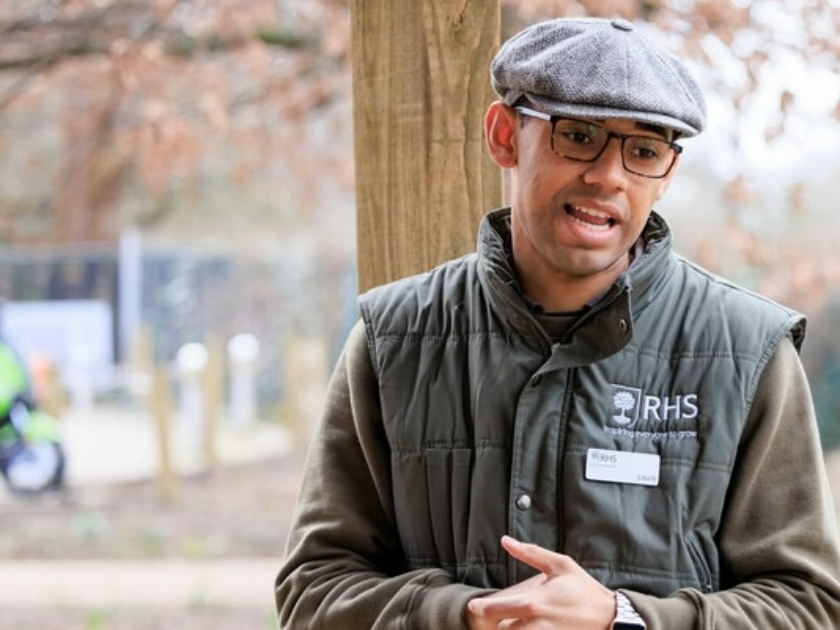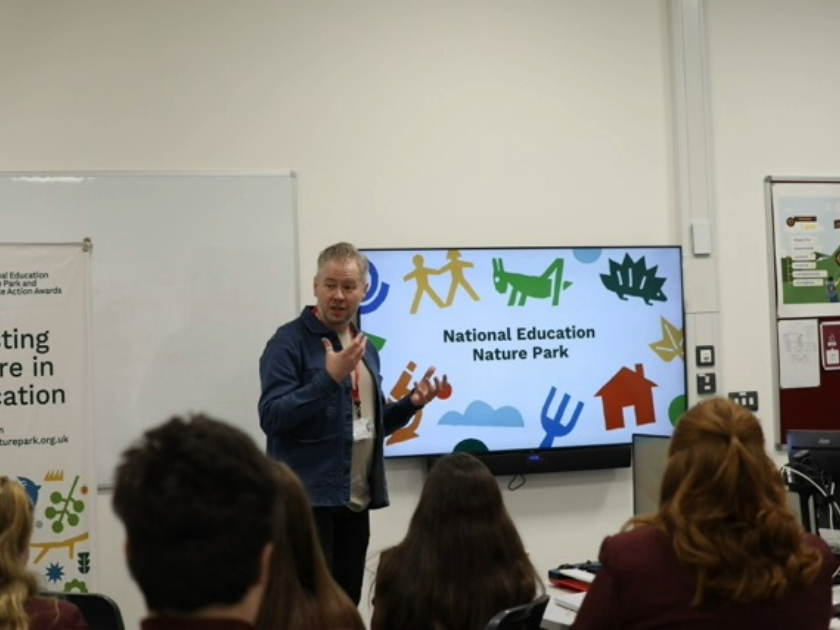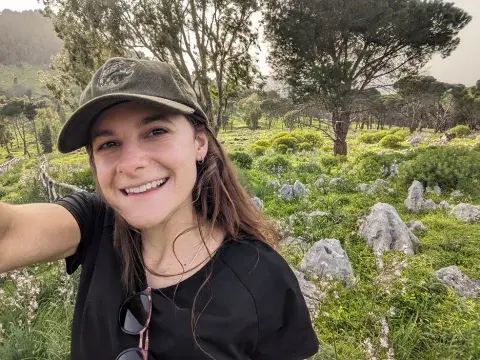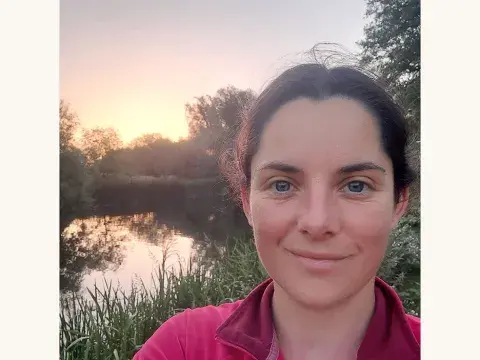Spotlight on green careers

It's Green Careers Week from 4-9 November, and to celebrate we are spotlighting members of the team that work on the Nature Park programme.
What is a green career?
The Green Careers Week campaign says that:
"...a green career can be any job, role or occupation that contributes to preserving or restoring the environment and our planet. It can be any industry, not just those seen as ‘green.’ Green skills are abilities, attributes, values, attitudes, knowledge, and technical skills needed to adapt services, processes and procedures to support climate change."
Participation in the Nature Park programme supports the development of six key green skills.
We've got a team with a wide range of skills, experience and knowledge working on the Nature Park programme, showing the broad range of roles that can be considered as a green career. In this blog, we meet some members of the team to find out more about their roles and journey to get there!
Louis Langenberg, Senior Programme Officer for the East of England (Royal Horticultural Society)

I'm Louis Langenberg, and I work at the Royal Horticultural Society as Senior Programme Officer for the National Education Nature Park in the East of England. As a child, I grew up growing runner beans and tomatoes from seed, and from this developed a keen interest in gardening.
I spent many summer evenings in the garden until I couldn't see without the security light being on! When I was at Sixth Form I worked at a children’s play area as a party host and volunteered at my local primary school, listening to pupils reading. This led to me studying Primary Education with Qualified Teacher Status at the University of Greenwich for three years. During my time at university, I undertook an enrichment placement at RHS Hyde Hall supporting the Education team leading on school trips to the garden.
I graduated in 2017 as a qualified Primary School Teacher and taught in a school in the London Borough of Havering. I ran a gardening club at the school and set up a school allotment with support of the community and some of the teachers. We grew fruit, vegetables and flowers and took part in the RHS School Gardening Awards, achieving Level 3!
After a few years of teaching, I realised my passion was working with students outside rather than the formal setting of the classroom. I was lucky enough to return to RHS Hyde Hall as a Freelance Education Officer, before taking a full time position with the RHS Community Outreach team during on wellbeing activities within community garden settings. This led to me completing my RHS Level 2 Practical Horticulture Course. And now, in 2024, I am back working with schools in my role as Senior Programme Officer for the National Education Nature Park!
I support Green Careers Week because it shows a variety of different roles which are available to everyone and an opportunity to connect to nature and the environment around you. We need more people to help preserve the great green space we already have.
My top sustainability tip is to grow plants for our pollinators. Whether you have a balcony or a large garden we can all have plants to help great a corridor between green spaces to help increase biodiversity across our country.
Martin Harrison, Senior Programme Officer for the West Midlands (Learning through Landscapes)

I'm Martin Harrison and I work at Learning through Landscapes as Senior Programme Officer for the Nature Park in the West Midlands. My 25 year plus career in the natural environment field all started with the tufted duck. The primary school I attended was adjacent to a nature reserve, which we would visit regularly, and I would go at weekends to bird watch and make my own bird ID file. It was then that my nature connection was born.
Once at secondary school I leaned towards the subjects I thought would help me to work in an area I had a real connection to and found fascinating. This led me to study Biology and Geography GCSE and A Level and Environmental Science A Level. Then I did a degree in Environmental Studies which gave me new skills both in knowledge, social skills, team working and helped me with the next step from formal education to work.
I signed up for a practical conversation course at a local college, two days a week at college and one day a week working with the local district council on countryside management. From planting trees to putting in fences, mending a stile in the middle of the moorlands, with the darkness drawing in and a field full of cows to keep in, we completed real life tasks which was very character building!
The other day of the week, I volunteered at the county Ecological Records Centre, where I would input species records, mainly bats, and because it was based at the local museum I got to visit Natural History section as much as I liked. I still see my manager there now and again, he is now Director of Museums. I also volunteered with what is now The Conservation Volunteers.
Both the college course and volunteer work, led to a temporary contract offer of a Ranger at Tittesworth Water. The day of my interview was heavy snow, but luckily with the help of my Dad I managed to get to site and I was offered the job.
Since that first role I have had a few roles, including a Countryside Ranger in the North West, where we won the Green Heroes award for partnership working, a community officer for The Wildlife Trust and back to Tittesworth as site manager. I also completed a Master's in Habitat Creation and Management.
My advice for future conservationists would be to get some qualifications if you can and volunteer with people and organisations with knowledge. I like to think that working in the environmental field is the same as the definition of a Local Nature Reserve, it's about people and wildlife. Get the knowledge and skills in both the natural environment and how to work with people and make contacts and friends for life.
I support Green Careers Week because it’s a great career, it is worthwhile, you can make a real difference, make friends for life, have the opportunity to be in the great outdoors, help your own well being and get paid for it too!
My top sustainability tip is to do what you can, have it as part of what you are as a person, and share this when and where is appropriate. Be realistic and thoughtful in this.
Laura Jacklin, Communications Manager for the National Education Nature Park (Natural History Museum)

Hi everyone! I'm Laura and lead on the communications for the National Education Nature Park. This involves spreading the word to schools to get more people on board, and sharing the inspiring stories from across the country as children and young people transform their outdoor spaces.
I've always been fascinated by the world around us, and how as humans we interact with the natural world. I went to university to study Anthropology which I really loved, as I learned about different cultures and humanity past and present. Alongside my studies, I took a keen interest in the outdoors, spending lots of time in the mountains of the UK through the Expeditions Society and with family and friends. My love for the natural world only increased the more time I spent outside, as well as my awareness of the pressures that we place on it.
I wasn't sure what I wanted to do after university, but took a job with a media agency where I learned about the world of advertising. I quickly realised that I wanted to get back to my passions of the natural world and was delighted to get a job in the marketing team at the Natural History Museum. After a few years of working in marketing and communications roles at the Museum, I took the role of the Communications Manager for the National Education Nature Park. I'm so passionate about this programme - I'm so excited by the impact it's already having on both people and nature and can't wait to see it grow.
My advice for people wanting to work in a green career would be to follow your interests and be curious! I didn't set out to have a career in communications, but by trying out lots of different roles I have been able to refine what interests me, what I'm good at and the sort of environment I like to work in. Being open minded and staying curious helps you to get to know yourself better, what next steps are best for you, and what causes or organisations excite and inspire you.
Dr Jade Gunnell, Senior Community Science Project Officer for the National Education Nature Park (Natural History Museum)

Hi, I’m Jade and I design and develop the activities and resources that get you collecting your own scientific data for the National Education Nature Park. This includes the habitat mapping activities, the digital mapping tools, and the wildlife surveys, like Pollinator Count. My job is to work out how we can make activities where you can collect, analyse and make use of your own real scientific data, and we can use the data for scientific research on the whole of the Nature Park.
When I was at primary school I lived in inner city Leeds. I was surrounded by buildings and roads and very little nature. But when I went to secondary school we moved to the countryside and suddenly I was able to run around in fields, and climb trees, and paddle in the river trying to catch little fish, and it was AMAZING. Having this freedom to explore and adventure in the great outdoors led me to fall in love with nature and inspired me to pursue a job that helped to learn about nature and protect it.
I went to university to study a Bachelors degree in Ecology and Conservation to learn how ecosystems work, then I studied a Masters degree in Science Communication to learn how to share this knowledge with other people, and finally I did a PhD in Community Science to learn how to get community scientists like yourselves involved in the whole scientific research process. It was a lot of studying, but between each degree I spent a couple of years working, doing all sorts of things that provided me with a broad range of skills and experience. I’ve done jobs like working in a wholefood store, managing public events for a city council, teaching people about science here at the Natural History Museum, and working in nursery schools looking after babies and toddlers.
My advice for people who’d like a green career is to identify what skills are required for the job you’d like to pursue and then seize lots of varied opportunities to build those skills. Opportunities could include starting your own project at home, volunteering for a local organisation, or getting a weekend or part-time job. To build the right skills you don’t need to do the exact job, you don’t need be perfect, and you don’t even need to go to a nature or sustainability organisation. Be open-minded about how skills you learn in a non-green role, could be applied to a green role, the broader your experiences the more you have to say and share when you do step into a job. And remember developing your skills will happen across your whole career, I am still learning and honing my skills every single day.